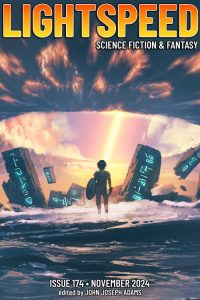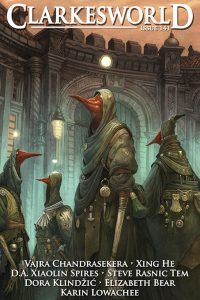Beneath Ceaseless Skies, Small Wonders, and Lightspeed: Short Fiction Reviews by Charles Payseur
 Beneath Ceaseless Skies 11/14/24, 11/28/24
Beneath Ceaseless Skies 11/14/24, 11/28/24
Small Wonders 11/24
Lightspeed 11/24
Beneath Ceaseless Skies opened November with an issue focused on revolution, including “Another Tide” by Will Greatwich, which finds the narrator leaving their home in a long-conquered area of a vast empire to visit and study its fringes, where resistance still lives embodied in a man named Goruna. The two meet, and the narrator joins Goruna’s cause as recorder, confidant, and eventually lover. And the picture of this man of violence and resistance is complicated by his knowledge that his cause is hopeless. For the narrator, though, whose hope has become so tied up with him, it’s not enough to fight only because fighting is the only right thing to do. They want to believe, want to think that change can happen. And Greatwich does such a good job of questioning and complicating that urge, revealing the grim reality that many resistances are crushed, and many revolutions fail. In the second of the month’s issues, Thomas Bales tells a story of silence, longing, and duty in “Speaking the Sun”. In it, the narrator has been tasked with talking the sun into the sky every day as part of a never-ending ritual. While he speaks, none are allowed to talk with him, but that doesn’t stop a man from approaching and breaking through the isolation the narrator has been living with since he was a boy. Slowly the two become closer, but duty and obligation always come between them, pushing them back into their expected roles and sacrifices. For all that the stakes are more personal, Bales echoes the themes of resistance and freedom, telling an aching and emotional story that hurts in all the best ways and finds its way toward love and joy.
The latest from Small Wonders includes Azure Arther’s poem “The Pixies Are in the Attic”, which takes a somewhat grim look at pixie habitation – trapped in attics and doomed if they should be discovered by humans. But the young push the boundaries and sneak where they’re not supposed to, risking everything to feel a high and taste of freedom they can get no other way. They are controlled, pinned, and can see only more of the same in front of them, which instills in them a kind of fatalism that the narrator of the piece recognizes and echoes. That in all of them, self-preservation is hardly useful when persevering serves only the interests of those with power over them. It’s a fascinating and insightful read. David Marino also appears in the issue with “Adjudication Form 134π53”, which is structured as Gavin Gunderson’s postlife exit interview. The form asks Gavin to weigh his life, showing his accomplishments and failures, his hopes and dreams and regrets. As such, it’s a rather heavy tour through his life and death, exploring his fears and insecurities, and gathering up all the “evidence” that might be required to judge whether his was a life well lived or wasted. And as such Marino really plays with the idea of judgement, placing readers in the seat of adjudicator, having to ultimately decide the worth of Gavin Gunderson and, though him, both ourselves and everyone around us. The story doesn’t answer but rather asks what is fair when judging another person’s life, and what gives that life meaning and worth. In a very small space the story opens up some huge questions, and they’re very much worth sitting and grappling with.
Oluwatomiwa Ajeigbe features in the November Lightspeed with “The Last Word”, which follows a spirit who has been imprisoned by a great and terrible empire. Once the guest of a city of mages, the spirit witnessed the empire’s violent arrival and fell victim to its power, trapped without a way to speak the magic of creation that still dwells inside them. This magic can only come through words, though – seven in total before the spirit ceases to exist – and the empire found a way to take away the spirit’s voice. After years in captivity, though, they found a different way to speak, and are absolutely done waiting for their freedom. Ajeigbe mixes action, magic, and a wild spectacle into a story about creation and power. The spirit is a part of the natural and magical world, and sees the damage being done all around them, the rot that has set deep into the fabric of the world, and acts to burn that rot out. Not for revenge, but rather to save what can be saved, and perhaps give the world a chance to try again without at least some of the forces and institutions pushing it toward ruin. It’s a great read.
Recommended Stories
“Speaking the Sun”, Thomas Bales (Beneath Ceaseless Skies 11/14/24)
“Adjudication Form 134π53”, David Marino (Small Wonders 11/24)
Charles Payseur is an avid reader, writer, and reviewer of speculative fiction. His works have appeared in The Best American Science Fiction and Fantasy, Lightspeed Magazine, and Beneath Ceaseless Skies, among others, and many are included in his debut collection, The Burning Day and Other Strange Stories (Lethe Press 2021). He is the series editor of We’re Here: The Best Queer Speculative Fiction (Neon Hemlock Press) and a multiple-time Hugo and Ignyte Award finalist for his work at Quick Sip Reviews. When not drunkenly discussing Goosebumps, X-Men comic books, and his cats on his Patreon (/quicksipreviews) and Twitter (@ClowderofTwo), he can probably found raising a beer with his husband, Matt, in their home in Eau Claire, Wisconsin.
This review and more like it in the January 2025 issue of Locus.
 While you are here, please take a moment to support Locus with a one-time or recurring donation. We rely on reader donations to keep the magazine and site going, and would like to keep the site paywall free, but WE NEED YOUR FINANCIAL SUPPORT to continue quality coverage of the science fiction and fantasy field.
While you are here, please take a moment to support Locus with a one-time or recurring donation. We rely on reader donations to keep the magazine and site going, and would like to keep the site paywall free, but WE NEED YOUR FINANCIAL SUPPORT to continue quality coverage of the science fiction and fantasy field.
©Locus Magazine. Copyrighted material may not be republished without permission of LSFF.







